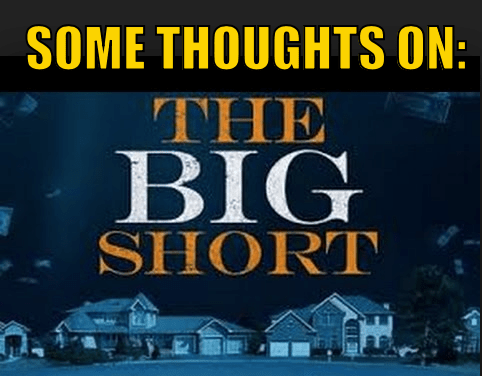We headed along to see The Big Short last week and found it an enjoyable watch. They do a great job of making a complicated subject on financial derivatives not just understandable to the layperson, but actually entertaining.
In case you hadn’t heard of it, it follows the “bears” in the lead up to the US housing bubble bursting. A bunch of outsider hedge fund managers who could see it coming and went about convincing banks to create the derivative products – the now infamous credit default swaps (CDS’s), that allowed them to bet on the collapse of the US housing market.
We’ve read criticisms of Michael Lewis’s book upon which the movie is based. Saying that it glorifies these very contrarian hedge fund managers.
But we weren’t left with that impression from the movie. The main characters did seem to struggle in the end with profiting off the pain of others. One of them Dr Michael Burry even went as far as to contact authorities on multiple occasions to try and explain what happened so it wouldn’t be repeated. But of course, no one was interested in listening.
A point we did take from the movie however was that not a great deal has changed since 2007.
As Dan Denning commented recently:
“The European Central Bank, for example, is busy trying to backstop the market for collateralised debt in the European banking system. It’s their preferred method for addressing undercapitalised banks in Italy. Package up the bad debts, slap a guarantee on them and sell them!
There’s nothing new under the sun. The only difference between now and 2008, is that the explosion in debt has expressed itself as $29 trillion in corporate borrowing. Low interest rates and bad monetary policy are at the root of all credit bubbles. You never know where the money is going to go. But it always goes somewhere.
This time around, nearly $5 trillion went into financing the US shale boom. The rest? Share buybacks, mergers and acquisitions, and the odd dividend payment. This debt may not be interest rate sensitive or house price sensitive in the way mortgage-backed bonds and collateralised debt obligations were. But ask yourself if the financial and banking systems are more stable and less risky now than they were eight years ago.”
An article in the NZ Herald this week even points out that the prices of these same types of derivatives have just jumped higher:
“The Australian gauge of credit default swaps – essentially insurance policies against debt default – jumped to its highest level since September 2012 yesterday afternoon, Bloomberg reported.”
The article went on to say that:
“Global concern about credit risk could increase the funding costs of local banks and lead to higher interest rates for New Zealand borrowers, a banking expert says.
The cost of insuring corporate bonds has spiked amid fears about the credit worthiness of financial institutions, driving a worldwide sell-off in bank stocks, including a more than 14 per cent plunge by Germany’s Deutsche Bank this week.”
Yes indeed it appears things haven’t really changed that much.
So will The Big Short help to raise awareness of this fact?
It seems it likely will. After all it is full of big names like Brad Pitt, Christian Bale, Ryan Gosling and Steve Carell, with an excellent performance, as the curmudgeonly Mark Baum (based upon Steve Eisman). It is very mainstream and being released globally in major cinemas, not just festivals and “art-house” theatres as previous documentaries on the subject have been.
But we did still leave the theatre with an overriding question on our mind though.
How did a movie that is so blatantly critical of Wall Street, big banks, bailouts and the like ever get made? Particularly with such a big name cast as this?
How could the powers that be let something so critical of the banking class not only get made, but get such a widespread release?
Here’s one theory for you.
Perhaps the aim is in fact to educate “the people” so that next time they won’t stand for bailouts of big banks. Why?
Well, the argument will be made that society simply can’t afford to bail out major banks this time.
Instead we’ll see “bail-ins”. Depositors will receive hair cuts and the money they thought was safely in the bank will evaporate.
So instead of an indirect bail out by the people as tax payers. Next time we may instead see the money taken directly off the people as bank customers.
That’s one theory anyway.
But do check out the movie and take someone along who is completely ignorant of the financial world. As they will certainly have their eyes opened. Just be sure you help them keep them open if or maybe when the next crisis rears up.

